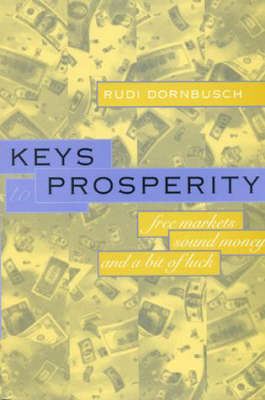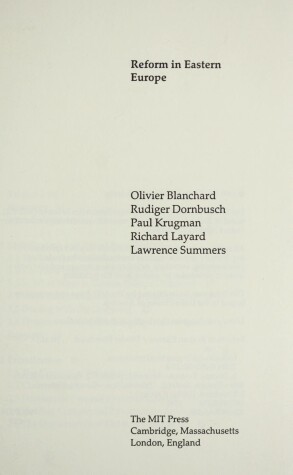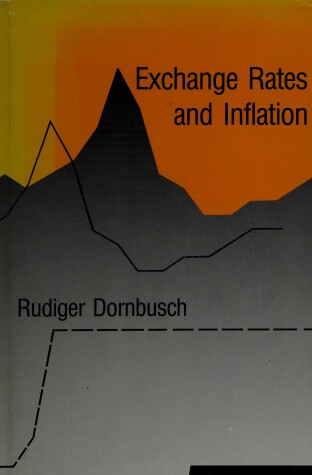The MIT Press
5 total works
The underlying theme of Rudi Dornbusch's work is unabashedly Chicago, namely, the University of Chicago belief that markets solve problems best and that most bureaucrats, even when well-intentioned, are distracted by politics or excessive zeal for perfect solutions. Dornbusch seeks to challenge those in charge with alternative answers and to limit their ambitions. He takes aim at central bankers, bureaucrats, unions, do-gooders, and politicians from Brazil, Japan, Russia, and other scenes of economic disaster.This book collects Dornbusch's recent commentaries from such publications as Business Week, the Wall Street Journal, and the Financial Times, as well as longer essays from recent and forthcoming books. The pieces focus on issues of domestic and international economic policy, including inflation and debt, exchange rates, trade policy, emerging markets, and the intersection of politics and economics. The writing is lively, opinionated, and informative.
Reform in Eastern Europe
by Olivier Blanchard, Rudiger Dornbusch, Paul R Krugman, Richard Layard, and Lawrence Summers
Published 29 January 1993
How can the new governments of Eastern Europe succeed in moving from centrally planned to free-market economies? This report identifies the major policy choices to be made and discusses what will work and what will not. "Reform in Eastern Europe" provides a statement of reform policy that stands in the mainstream of modern Western economics. Based on their experience with stabilization polices in other countries, the authors show how Eastern Europe can reduce unemployment during the painful adjustment process, create effective and socially acceptable mechanisms to subject enterprises to market discipline, and replace barter trade under CMEA with market-based international trade. Although conditions vary from country to country in Eastern Europe, the authors argue that all countries must seek stabilization and price liberalization, privatization, and then economic restructuring. It describes and evaluates the alternatives available to eliminate fiscal deficits, control money creation, and decontrol prices while blunting the immediate painful effects of lower wages, unemployment, and other disruptions.
The authors propose a plan for privatizing state-owned enterprises without placing them in the hands of those who accumulated wealth under the communist regimes. They recommend and detail methods for achieving orderly restructuring - in effect, closing most of the existing production structures and creating a whole new economy - covering issues of national saving, the creation of a financial intermediation system, the role of direct investment, labour allocation and unemployment.
The authors propose a plan for privatizing state-owned enterprises without placing them in the hands of those who accumulated wealth under the communist regimes. They recommend and detail methods for achieving orderly restructuring - in effect, closing most of the existing production structures and creating a whole new economy - covering issues of national saving, the creation of a financial intermediation system, the role of direct investment, labour allocation and unemployment.
Rudiger Dornbusch's articles on exchange rates and open economy macroeconomics are among the most frequently cited in the field of international economics. Collected for the first time in "Exchange Rates and Inflation, "these articles, written over the past fifteen years, cover a wide range of issues while providing unique insights into the research style of a major economist. During this period the economics profession has shifted from global monetarism to the new classical economics, and Dornbusch's own interests, and some of his beliefs, have changed as well.Twenty two articles are gathered in four parts: Exchange Rate Theory; Special Topics in Exchange Rate Economics; Equilibrium Real Exchange Rates, and Inflation and Stabilization. Each part includes an introduction that discusses the essays and places them in context.
Over the past decade, a small group of economists has challenged traditional wisdom about international trade. "Rethinking International Trade provides a coherent account of this research program and traces the key steps in an exciting new trade theory that offers, among other possibilities, new arguments against free trade. Krugman's introduction is a valuable guide to research that has delved anew into the causes of international trade and reopened basic questions about the international pattern of specialization, the effects of protectionism, and what constitutes an optimal trade policy In the four sections that follow, he takes a revisionary look at the causes of international trade, and discusses growth and the role of history, technological change and trade, and strategic trade policy. Essays in part I review and challenge the theories of Ricardo and his successors, rethinking a 160-year tradition of looking at international trade. Models are presented in which trade frequently arises because of opportunities to exploit increasing returns through exports rather than from comparative advantage. In part II, Krugman traces the resulting pattern of trade specialization not only to the influence of comparative advantage but also to more arbitrary factors such as historical events, the rachet effect of cumulative processes, technological changes, and temporary economic shocks. Part III expands on the theme of technological change as a key factor in determining the pattern of specialization in international trade and addresses questions about the effects of innovation, or lack of it, on a country's international trade position. The concluding essays examine the issue of protectionismalong with other elements of trade policy, showing how protectionist policies, used as an export enhancement device by some national governments, may shift world specialization to the advantage of the protectionist nations. Paul R. Krugman is Professor of Economics at MIT.
East-West Migration
by Richard Layard, Olivier Blanchard, Rudiger Dornbusch, and Paul Krugman
Published 23 September 1992
This sequel to "Reform in Eastern Europe" is a report on one of the most pressing issues for countries with economies in transition and their neighbours. Focusing on the problem of East-West migration, the authors delineate and promote the notion of European free trade and capital flows as a means of raising productivity and increasing worker stability in the East and of reducing income gaps between countries. As economists who have been deeply and consistently involved in the recent upheavals in the East, the authors are in a position to take a well-informed stance on the economic and social dislocations that are occurring. They first outline the problem and recommend that Europe begin to admit primary migrants and that the US increase its quota. They then look at migration statistics from previous eras to predict equivalent levels in the near future and take into account the long-run and short-run effects of migration in the US and Europe. They conclude with a discussion of "the best defense of all", economic progress, and lay out the necessary conditions for free trade, investment, and aid.




